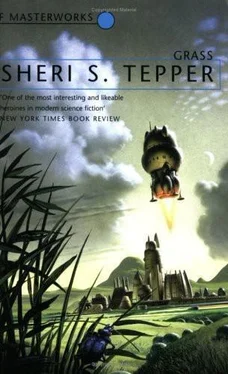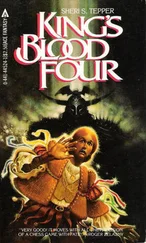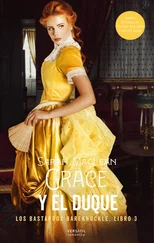“The bons don’t know,” Marjorie said, a statement rather than a question.
“Right, they don’t know. Don’t know, won’t be told, don’t want to hear. Taboo for ’em.”
“I do have something you may not know,” she said, getting up to fetch the trip recorder and punching up the pattern she had walked over in the cavern. “I have been told that the thunderous noise we sometimes hear is Hippae, dancing. Well, this seems to be what the dancing produces.”
Brother Mainoa stared at it, at first in confusion, then in disbelief.
Marjorie smiled. Good. For all his knowing looks, he wasn’t omniscient, then.
It was Rillibee who said, almost casually, “It looks like the words in the Arbai books, doesn’t it, Brother?”
“The spherical peepers!” Marjorie exclaimed, remembering suddenly where she had seen the rotund peepers and heraldric hounds, carved on the housefronts of the Arbai city. The twining design did look like the words in the Arbai books — or like the vines carved on the housefronts. She mentioned this, occasioning a deep and thoughtful silence from everyone.
Though the conversation later turned to other things, including whether there was or was not unexplained death upon Grass (for Marjorie and Tony remained aware of their duty) the pattern on Marjorie’s recorder was in all their minds. Brother Mainoa, particularly, wanted very much to show it to a friend — so he said as he departed — and Marjorie let him borrow the recorder, believing he meant some friend among the Green Brothers.
It was only after he was gone that she began to wonder how it was that Brother Mainoa had seen the caverns of the Hippae and had escaped to tell them about it.
When Rigo left for the Hunt on the following day, the last Hunt to be held at Klive, Stella, who had been thinking much of Sylvan, demanded to go with him.
“You said you wouldn’t risk the children,” Marjorie reminded him. “Rigo, you promised.” She would not cry. She would not shout. She would merely remind him. Still, the tears hung unshed in her eyes.
He had forgotten he had wanted tears, and tears over the children would never have satisfied him in any case. “I wouldn’t have,” he explained in his most reasonable voice. “I would never have ordered any of you to ride. But she wants to. That’s a different matter.”
“She could die, Rigo.”
“Any of us could die,” he said calmly, gesturing to convey a hostile universe which plotted death against them all. “But Stella won’t.
According to Stavenger bon Damfels, she rode brilliantly.” He said the word as though it had been an accolade. “Stavenger urged me to bring her again.”
“Stavenger,” Marjorie said quietly, the name seething on her tongue. “The man who beat Rowena half to death and attempted to starve her. The man who hasn’t figured out yet that she is gone. That Stavenger. Why would you risk Stella’s life on Stavenger’s say-so?”
“Oh, Mother,” Stella said in a voice very much like her father’s in its obdurate reasonableness. “Stop it! I’m going, and that’s that.”
Marjorie stood on the terrace steps and watched them go, staring into the sky until the car became merely a dot and vanished. As she was about to go in, Persun Pollut came up behind her. “Lady…”
“Yes, Persun.”
“You have had a message on the tell-me. Sylvan bon Damfels asks if you will be attending the Hunt, I told him you would not. He says he wishes to visit you here, this afternoon.”
“He may have word of Rowena,” Marjorie said sadly, still staring at the empty sky where they had gone. “Bring him to my study when he arrives.”
When he came, he did have some word of Rowena. As Marjorie commiserated and exclaimed, he told her that the wounds to Rowena’s flesh were healing. The wounds to her mind were more troublesome. Finding Dimity had become an obsession with her. She could not admit that the girl was gone forever, or if not, that finding her might be more heartbreaking than considering her dead.
None of which was what Sylvan had really come to say. He soon left the subject of Rowena and Dimity, which he found painful, and began to talk of something else. It had been so long since Marjorie had been the object of anyone’s overt romantic intentions that he had managed to get out most of what he had planned to say, however allusively and poetically, before she realized the tenor of his words.
“Sylvan,” she begged, suddenly terrified. “Don’t.”
“I must,” he whispered. “I love you. I’ve loved you since the moment I saw you. The moment I first took you into my arms on the dance floor. You must have known. You must have felt—”
She shook her head, forbidding him to say anything more. “If you say anything else, Sylvan, I will have to forbid you this house. I am not free to listen to you. I have a family.”
“So? What difference does that make?”
“To you, none perhaps. To me, all the difference.”
“Is it your religion? Those priest persons you have with you? Do they guard you for Rigo?”
“Father Sandoval? Father James? Of course not, Sylvan. They help me guard myself!” She turned away from him. exasperated. “How can I explain to you? You have none of the same ideas. And you are so young. It would be a sin!”
“Because I am young?”
“No. Not for that reason. But because I am married to someone else, it would be a sin.”
He looked puzzled. “Not on Grass.”
“Have you no sacrament of marriage upon Grass?”
He shrugged. “It is not marriages the bons need but children. Proper children, of course, though the fiction will often do as well as the fact. There’s many a bon with commoner blood, though the Obermuns would deny it. Well, look at it yourself! Why should Rowena have a lonely bed all spring and all fall while Stavenger hunts, or recovers from hunting, or sweats thinking of hunting again? I have no doubt Shevlok is Stavenger’s son, but I have some doubts about myself.”
“Have you no sins upon Grass? Nothing that you feel is wrong to do?”
He stared at her, as though trying to see past her surface to the mystery she confronted him with. “It would be wrong to kill another bon, I suppose. Or to force a woman if she weren’t willing, or hurt a child. Or to take something from some other estancia. But no one would see it as wrong for us to be lovers.”
She regarded him almost with fear. His eyes glowed with fervor, his hands reached out to her. Her fleeting desire to take those hands filled her with panic. So she had once longed to take Rigo’s hands. How could she convince someone who had so little in common with her when her own self was conspiring against her? “You say you love me, Sylvan.”
“I do.”
“And by this you mean more, I presume, than mere lust. You are not telling me only that you want my body.” She flushed, saying this, a thing she had never said, not even to Rigo. It was only possible to say it if she walked away from him, to the window where she stood looking out.
“Of course not,” he blurted, stung.
She spoke to the garden. “Then, if you love me, you will say nothing further about it. You must accept what I tell you. I am married to Rigo It does not matter if that marriage is happy or unhappy. It doesn’t matter that you and I might be happier together than either of us might be with others. None of that matters, and you must not speak of it! My marriage is a fact in my religion, and that fact can’t be changed. I will be your friend. I cannot be your lover. If you want religious explanations, ask Father Sandoval to explain it If I were even to converse with you about it, it would be an occasion of sin.”
“What can I do?” he begged. “What can I do?”
Читать дальше












